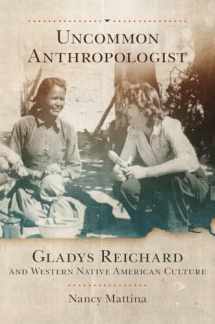
Uncommon Anthropologist: Gladys Reichard and Western Native American Culture
ISBN-13:
9780806164298
ISBN-10:
0806164298
Edition:
Illustrated
Author:
Nancy Mattina
Publication date:
2019
Publisher:
University of Oklahoma Press
Format:
Hardcover
350 pages
Category:
Women
,
Specific Groups
FREE US shipping
Book details
ISBN-13:
9780806164298
ISBN-10:
0806164298
Edition:
Illustrated
Author:
Nancy Mattina
Publication date:
2019
Publisher:
University of Oklahoma Press
Format:
Hardcover
350 pages
Category:
Women
,
Specific Groups
Summary
Uncommon Anthropologist: Gladys Reichard and Western Native American Culture (ISBN-13: 9780806164298 and ISBN-10: 0806164298), written by authors
Nancy Mattina, was published by University of Oklahoma Press in 2019.
With an overall rating of 4.4 stars, it's a notable title among other
Women
(Specific Groups) books. You can easily purchase or rent Uncommon Anthropologist: Gladys Reichard and Western Native American Culture (Hardcover) from BooksRun,
along with many other new and used
Women
books
and textbooks.
And, if you're looking to sell your copy, our current buyback offer is $0.3.
Description
A trailblazer in Native American linguistics and anthropology, Gladys Reichard (1893–1955) is one of America’s least appreciated anthropologists. Her accomplishments were obscured in her lifetime by differences in intellectual approach and envy, as well as academic politics and the gender realities of her age. This biography offers the first full account of Reichard’s life, her milieu, and, most importantly, her work—establishing, once and for all, her lasting significance in the history of anthropology.
In her thirty-two years as the founder and head of Barnard College’s groundbreaking anthropology department, Reichard taught that Native languages, written or unwritten, sacred or profane, offered Euro-Americans the least distorted views onto the inner life of North America’s first peoples. This unique approach put her at odds with anthropologists such as Edward Sapir, leader of the structuralist movement in American linguistics. Similarly, Reichard’s focus on Native psychology as revealed to her by Native artists and storytellers produced a dramatically different style of ethnography from that of Margaret Mead, who relied on western psychological archetypes to “crack” alien cultural codes, often at a distance. Despite intense pressure from her peers to conform to their theories, Reichard held firm to her humanitarian principles and methods; the result, as Nancy Mattina makes clear, was pathbreaking work in the ethnography of ritual and mythology; Wiyot, Coeur d’Alene, and Navajo linguistics; folk art, gender, and language—amplified by an exceptional career of teaching, editing, publishing, and mentoring.
Drawing on Reichard’s own writings and correspondence, this book provides an intimate picture of her small-town upbringing, the professional challenges she faced in male-centered institutions, and her quietly revolutionary contributions to anthropology. Gladys Reichard emerges as she lived and worked—a far-sighted, self-reliant humanist sustained in turbulent times by the generous, egalitarian spirit that called her yearly to the far corners of the American West.


We would LOVE it if you could help us and other readers by reviewing the book
Book review

Congratulations! We have received your book review.
{user}
{createdAt}
by {truncated_author}


